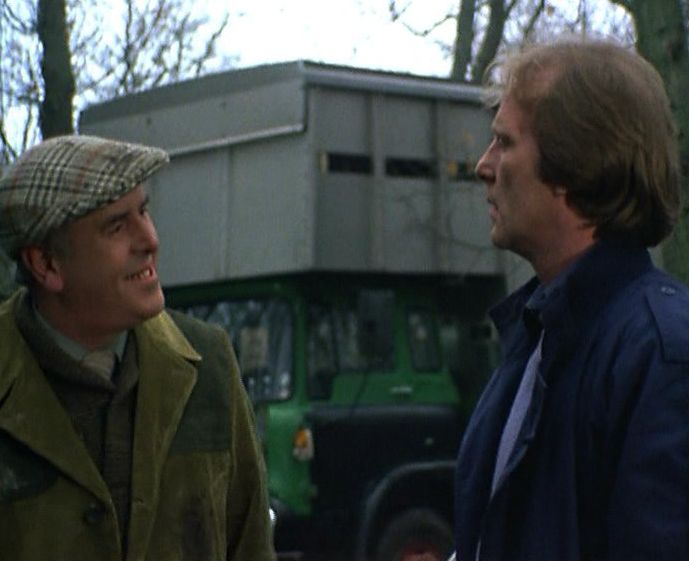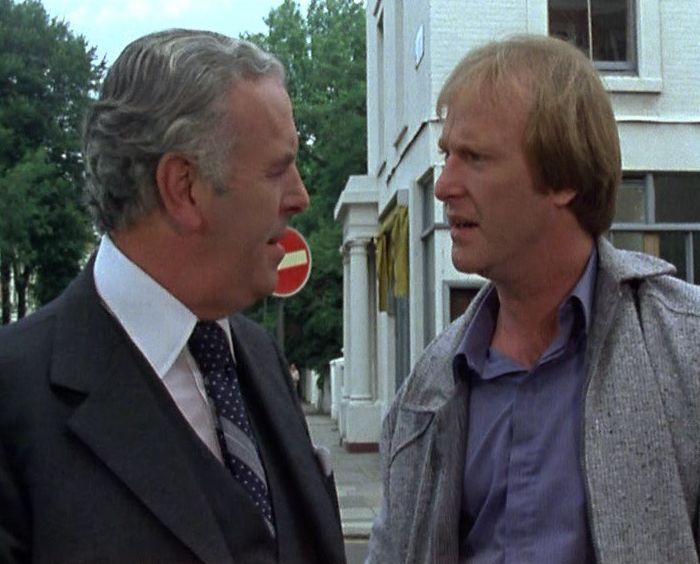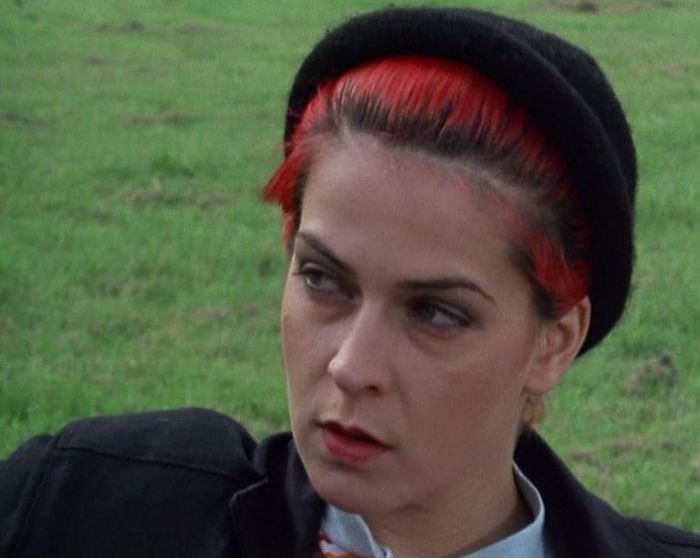
Terry is far from impressed with his latest minding job – a racehorse called Pelmet – but the sight of its attractive jockey, Jocelyn Maxwell-Saunders (Liza Goddard), softens the blow somewhat ….
National Pelmet, scripted by Willis Hall, was the first episode of Minder‘s second season and was originally broadcast on the 11th of September 1980. It opens at a racecourse and after a couple of minutes of horsey colour we see Arthur and Terry emerging from a marquee. Naturally, Arthur has entered into the spirit of things – he’s an absolute vision. decked out in wellingtons, binoculars, walking stick and a bow-tie.
Early on, the Arthur/Terry dynamic seems firmly slanted in the older man’s favour. Arthur rubbishes Terry’s choice of a horse (“Lily Law?”) and advises him to stick his money on Spring Return. Terry does so and it’s utterly predictable that Spring Return refuses the first fence whilst Lily Law (with Jocelyn onboard) romps home to an easy victory.
Arthur being Arthur, of course, is completely unabashed after leading Terry astray. “If you have a fancy, a feeling in your water, stick to it. You shouldn’t listen to me, you should be strong-willed in this world, Terry. Implacable, like me”.
Arthur has two gross of 100% genuine reproduction statuettes of Milton (“Paradise Lost, Paradise Got Back”) and believes that his well-healed contact Jeremy Burnham-Jones (Robert Swann) will be able to help him shift them (Jeremy has an antiques shop in Brighton). And since Jeremy has a racehorse called Pelmet which he wants protected before the big race, Arthur sees a way to kill two birds with one stone.
En-route to Brighton on the train, there’s a telling non-verbal moment which suggests that Terry’s not always going to be a pushover. Arthur and Terry visit the buffet car and Arthur asks for a couple of light-ales and sandwiches. After Arthur’s been told the price, he looks encouragingly at Terry who ignores him, forcing Arthur to find the money himself. This is very underplayed – there’s no outward change in either of their expressions – but it’s a good character moment nonetheless.
As they settle back into their seats, Arthur – always a nostalgic – bemoans the fact that luxury rail travel is now a thing of the past. At one point, he tells Terry, all the famous theatrical knights would be on the London to Brighton train – but not any more. “Can you see Johnny Gielgud, Sir Johnny Gielgud no less, with his light ale slopping around in his plastic beaker while he stuffs an individual fruit pie into his north and south?” Simply glorious.
There’s plenty of comedy to be mined from Terry’s reluctant guarding of Pelmet – from the fact that the horse is rather flatulent, to the way that Terry accidentally eats food prepared for one of the other horses (which has a dose of laxatives included!) It’s not subtle but it passes the time nicely enough. Indeed, National Pelmet is a story that’s low on incident and action – we’re more than thirty minutes in before the mysterious stranger who’s been keeping tabs on the stables – Brickett (Ken Hutchinson) – makes a move and attacks Terry.
The ensuing fight is brief but thanks to the combination of straw from the stable and an overturned lamp, it creates a fire which wakes everybody up and moves the story up a gear. But it later becomes clear that this is something of a cheat – Brickett isn’t interested in Pelmet, he’s the ex-husband of stable-girl Rita (Jane Carr) and although they’re now divorced he’s still following her around the country, attacking anybody who even speaks to her.
From the first time we meet her, Rita is clearly shown to be interested in Terry, but he’s utterly dismissive of her. Given Terry’s insatiable interest in the opposite sex this is a little difficult to fathom – possibly Rita was written as a more dowdy character but as Jane Carr isn’t unattractive and plays Rita as a perfectly pleasant young woman it makes Terry’s indifference and cutting remarks seem rather cruel.
When Terry and Rita confront Brickett, it gives her the chance to explain exactly what the situation is – which she does most forcibly. Carr delivers this impassioned monologue very well (Rita’s ex-husband turned overnight from a normal chap into a religious maniac) although this sudden lurch into drama seems a little out of place with the light-hearted tone of the rest of the episode.
You might have expected that Jocelyn, especially given the casting of Liza Goddard, would have played a larger role in the story but she’s somewhat of a peripheral figure.
It doesn’t take a mind-reader to guess what will happen when, towards the end of the story, Arthur confidentially predicts that Pelmet is a dead-cert. This time Terry is wiser (especially after having witnessed Jeremy placing all his money on the second favourite) and puts his bet elsewhere. Jocelyn falls off (a blatant dive) which means that Arthur’s lost a bundle whilst Terry’s emerged ahead for once.
When we learn that Jeremy and Jocelyn are an item, all becomes clear. This surprises Terry who’d tagged Jeremy as gay (Terry’s hostility towards anybody he considers to be “queer” is one of his less attractive traits in these early stories). It’s slightly unexpected that Jocelyn turned out to be a wrong ‘un, but since she wasn’t too developed a character it’s not the jolt it could have been.
Arthurs’ incurable optimism can be seen at the end, in my favourite scene from the story. Arthur’s still lumbered with his Milton statuettes but he has a plan – paint them blue and white and they can be sold as Chelsea footballers! When Terry points out that Milton’s a famous poet with a book in his hand, Arthur has a ready answer. “FA handbook, innit?”
Possibly not the tightest script that Minder ever had, but Willis Hall’s first contribution managed to easily nail the Arthur/Terry relationship and if that’s right then it’s possible to forgive a slightly humdrum story.






















